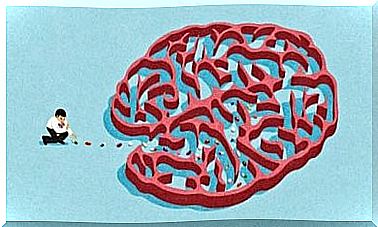Stress And Hyperthyroidism: A Relationship With Serious Effects

Stress and hyperthyroidism share a very important relationship. However, we often do not understand the impact that chronic stress can have on our overall health. Cortisol, the hormone associated with conditions such as hyperactivity and hypervigilance (stress, in other words), not only changes our thyroid function to an unhealthy point of acceleration, but also our adrenal glands.
We know that the diseases associated with the thyroid gland are very common. We also know that they evolve due to many different factors. Thus, autoimmune conditions such as Graves’ disease, pregnancy, changes in the pituitary gland or a lack of iodine can cause us to develop hypothyroidism (low metabolism) or hyperthyroidism (high metabolism).
On the other hand, we do not always know how much our emotions and feelings can change and affect our body. In fact, they can have a profound effect on our metabolism. Thus, studies such as those published in the journal Thyroid Research are important because they show a clear relationship between levels of cortisol and TSH (thyroid-stimulating hormone).
In other words, stress represents a risk factor for hyperthyroidism. Stress, anxiety and constant worry over several months or even years, end up affecting the function of the thyroid gland by accelerating it.

The link between stress and hyperthyroidism
Every day new diagnoses are made that are related to changes in the thyroid gland. We can not forget that the thyroid hormones fulfill many functions. These hormones are essential for keeping our tissues healthy and for fulfilling an infinite number of metabolic tasks, such as protein synthesis.
This is why patients with hyperthyroidism usually suffer from a wide range of symptoms and a variety of other disorders. These symptoms and associated conditions can be summarized as follows:
- Unusual nervousness and restlessness.
- Fluctuations in mood that make the person more irritable.
- An experience of weakness.
- Increased appetite.
- Weight loss despite increased appetite and food intake.
- Problems with concentration and memory.
- Goiter : a symptom associated with hyperthyroidism in which the person suffers from swelling in the throat and has difficulty swallowing, drinking or talking.
- Thinning or hair loss.
- Thinner skin.
- Small tolerance for heat.
- Changes in menstruation.
- Tachycardia (fast pulse).
- Sleep problems.

In addition, diseases related to the thyroid gland affect more men than women. However, once the diagnosis is made, we often forget to stop and think about what may have caused the disease.
Proper treatment is very important because a therapeutic strategy will drastically improve the patient’s quality of life. However, since there is a direct relationship between stress and hyperthyroidism, we should also know how the body produces this relationship.
Stress and hyperthyroidism: a change in thyroid antibodies
In 2012, several Dutch universities funded a thorough and comprehensive study. The goal was to find out the relationship between stress and hyperthyroidism. The significant results of this study were then published in the journal Psychoneuroendocrinology. The study showed that cortisol has a serious effect on the thyroid gland in stressful situations.
- Antibodies from the thyroid gland are altered and actually begin to attack our body. They also generate changes such as fatigue, sleep disturbances, indigestion, hair loss, thin skin, etc. Changes also often occur at a cognitive level, which explains the fluctuations in mood and difficulty concentrating.
- People with panic disorders also often suffer from problems associated with the thyroid gland. This comorbidity creates a cycle that results in classical hyperthyroidism and has serious clinical consequences.

Prevention of hyperthyroidism caused by stress
Hyperthyroidism (whether it is caused by stress or not) will undoubtedly have a specific treatment method: antithyroid drugs such as propylthiouracil and methimazole. However , each patient’s case is different. Each patient must receive a professional evaluation to find the most appropriate and effective treatment for them.
In addition to treatment, however, it is also important that we know how to prevent these conditions in the first place. The trigger will not always be stress, we must also take the autoimmune disorders into account. However, since certain psychological conditions trigger metabolic changes, we need to know how to deal with these situations. Below we have found some suggestions that may help.
- Limited stress over time has no effect on the thyroid gland. The problem is chronic stress that we do not handle, control or acknowledge. Therefore, we need to spend some time each day taking care of every worry, every complex emotion and every thing that bothers our mind. Do not let what bothers you today wait until tomorrow.
- Give yourself enough quality time. Throughout the day, we must have at least two hours just for ourselves. Physical exercise, yoga or techniques such as mindfulness are very effective in dealing with stress.
- In the same way, it is important that we take care of our diet and improve our habits. It is important to focus on rest with good quality and positive social relationships that can give you energy.
To conclude, since stress and hyperthyroidism are related, taking care of our emotions, such as stress and anxiety, means investing in our health. If we get up, take a shower and get dressed every day, we can also manage to participate in our own, inner and complex universe every day.









